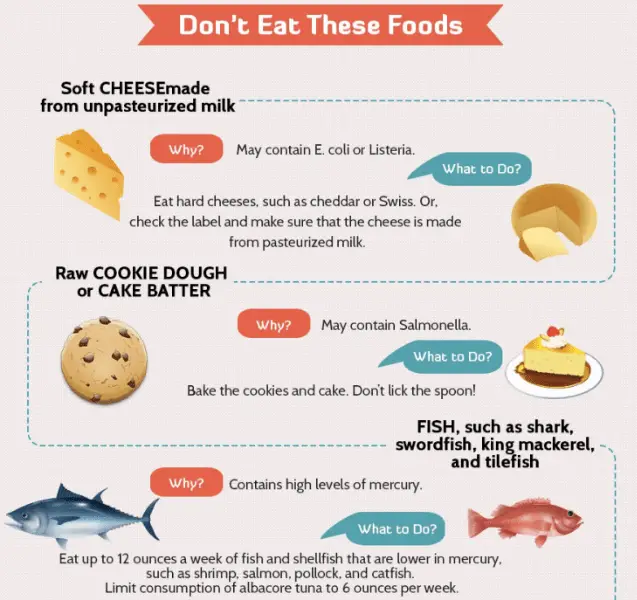Can You Eat Provolone When Pregnant?
Calcium-rich foods are highly recommended during pregnancy to provide nutrients to the growing baby. Since cheese is a great source of calcium along with other essential nutrients, can you consume cheeses like provolone when pregnant?
Provolone During Pregnancy:
Provolone cheese is an aged, semi-hard cheese that is prepared from cow’s milk. It has a mild smoky flavor (see other types) and smooth texture. And yes, you can consume it safely during pregnancy.
But, below are a few things you should be taking note of.
Why is Provolone considered healthy during pregnancy?
There are several reasons why Provolone is considered healthy during pregnancy, such as:
- Provolone are inherently lower in water content which makes it harder for some hazardous bacterial agents to grow and cause disease in the pregnant women.
- Most varieties of provolone cheese are free from preservatives and fillers, which makes it a healthy dietary choice for pregnant women.
- Provolone cheese is also matured for months (or even up to years) which is considerably longer than the maturation period of soft cheeses.
- Most varieties of Provolone cheese are also free from gluten and hence tolerated and digested better in some susceptible women.
There are 2 types or varieties of Provolone cheese:
- Provolone Dolce: This is the milder, creamier variety that is prepared from calf’s rennet. It is generally aged for up to 3 months.
- Provolone Piccante: This is the sharper, more pungent variety of provolone that is prepared from lamb or goat’s rennet and is generally aged for 4 months to up to 1 year.
It is important to mention that both varieties of provolone cheese are safe. Pregnant women can consume provolone cheese as sandwich cheese or as dinner cheese or dessert cheese. The taste and flavor profile of Provolone cheese is elevated if it is melted, which makes it a great option for hoagies and paninis. The grated variety of provolone cheese can be used over pasta, salads & soups.
You can even consume it smoked or unsmoked depending on your preference.
Nutrition wise, is provolone a heathy cheese option during pregnancy?
Nutritionists consider provolone a healthy cheese option that is rich in nutrients such as proteins, minerals like (calcium & phosphorus) and vitamin A.
- Calcium & Phosphorus helps in the development of bones, skeletal structures, and teeth. More than 99% of Calcium and about 85% of the total body Phosphorous is stored in the bones. This also means that only less than 1% calcium is circulated free in our body which contributes to optimal muscle function, nerve transmission, hormonal secretions, and other vital functions. A pregnant women requires 1,000 to 1,200 milligrams of Calcium as part of their recommended daily allowance. 1 oz. or 1 serving of provolone cheese supplies 214 milligrams of calcium (almost 1/4th to 1/5th of recommended daily allowance).
- Vitamin A: Vitamin A helps in cellular growth and differentiation as well as bone remodeling. A healthy adult woman requires 2,330 IUs of Vitamin A. 1 oz. or 1 serving of provolone cheese supplies 249 IU of Vitamin A
- Proteins & minerals also helps in the development of organs and organ systems such as contraction of muscles, kidney function, development and functioning of heart, blood clotting, development of nerves and cell/ tissue repair.
Besides healthy nutrients, provolone cheese is also rich in saturated fatty acids and sodium. When consumed in high doses, saturated fats and sodium may prove harmful and thus should only be consumed in moderated doses.
- 1 oz. of Provolone cheese contains 7.55 grams of fats of which saturated fats are 4.84 grams.
- Likewise, an adult woman should consume under 1,500 mg of sodium, whereas 1 oz. of Provolone supplies 248 mg of sodium.
Shouldn’t you only consume pasteurized provolone during pregnancy?
Check the label, it is extremely important to consume pasteurized provolone during pregnancy because consumption of unpasteurized ones may increase the risk of certain infections such as listeriosis that may pose threat to the growth of your unborn baby (2).
See this list of 100+ type of cheese, some are unpasteurized.
Listeriosis is a bacterial infection that is caused by the bacteria, listeria. The infection is generally mild and non-life threatening in adults, but pregnant women are 10-times more likely to develop it, causing serious complications like pre-term labor, still-birth or even loss of pregnancy.
The process of pasteurization kills the harmful bacteria, but a drawback of the process is, pasteurization may also kill some good bacteria and denature some vital nutrients such as vitamins and amino acids.
Popular provolone brands that are stated safe for pregnancy are, Alpine Lace, Glacier Ridge (like this one on Amazon), and Sargento. But always make sure to check for the expiry date and overall texture of cheese before consuming.

What chesses and symptoms to watch out for?
If you are pregnant, avoid soft & mold-rippen cheeses such as (3):
- Camembert
- Brie
These 2 types of cheese provide a favorable environment to the growth of harmful bacteria die to low acidity, high moisture, and low salt content
Also avoid blue-veined cheeses, some examples are:
- Stilton
- Danish Blue
It is believed that Hispanic women are 24 times at higher risk of developing Listeria, so avoid Hispanic cheeses such as queso panela, queso fresco, queso blando, queso ranchero, queso blanco, queso cotija, and cuajada en terrón (4).
Pont L’Eveque, Cambozola, and Tallegio are some other varieties to avoid. In addition, avoid any unpasteurized varieties of cheeses.
If you have consumed a potentially hazardous variety of soft cheese or contaminated food, see your doctor at earliest convenience. Listeriosis presents with flu-like symptoms, such as (2,3):
- Headache
- Muscle aches
- Vomiting
- Fever
- Nausea
Conclusion
Provolone is generally safe for pregnant women to consume in moderation. Not only that it is delicious but also providing tons of nutrition to your body. Be make sure that to always for the pasteurised label and only buy from trusted brand. That said, this one is my strong recommendation, enjoy!
Read more: what’s the stinky smell in provolone?
References:
- Aponte, M., Fusco, V., Andolfi, R., & Coppola, S. (2008). Lactic acid bacteria occurring during manufacture and ripening of Provolone del Monaco cheese: Detection by different analytical approaches. International Dairy Journal, 18(4), 403-413.
- Jackson, K. A., Iwamoto, M., & Swerdlow, D. (2010). Pregnancy-associated listeriosis. Epidemiology & Infection, 138(10), 1503-1509.
- Madjunkov, M., Chaudhry, S., & Ito, S. (2017). Listeriosis during pregnancy. Archives of gynecology and obstetrics, 296(2), 143-152.
- Jackson, K. A., Biggerstaff, M., Tobin-D’Angelo, M., Sweat, D., Klos, R., Nosari, J., … & Fagan, R. P. (2011). Multistate outbreak of Listeria monocytogenes associated with Mexican-style cheese made from pasteurized milk among pregnant, Hispanic women. Journal of food protection, 74(6), 949-953.

